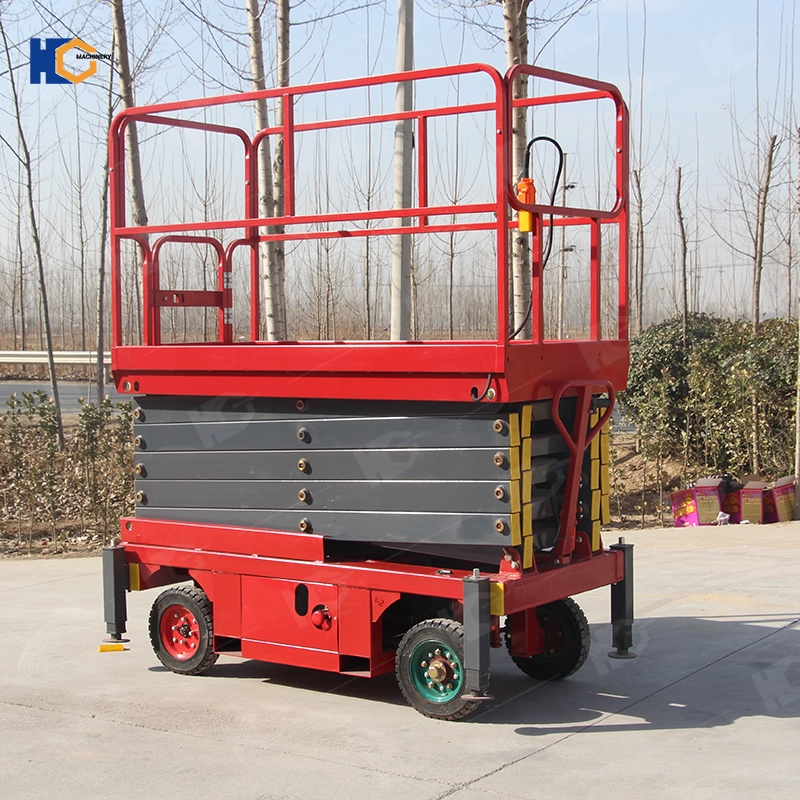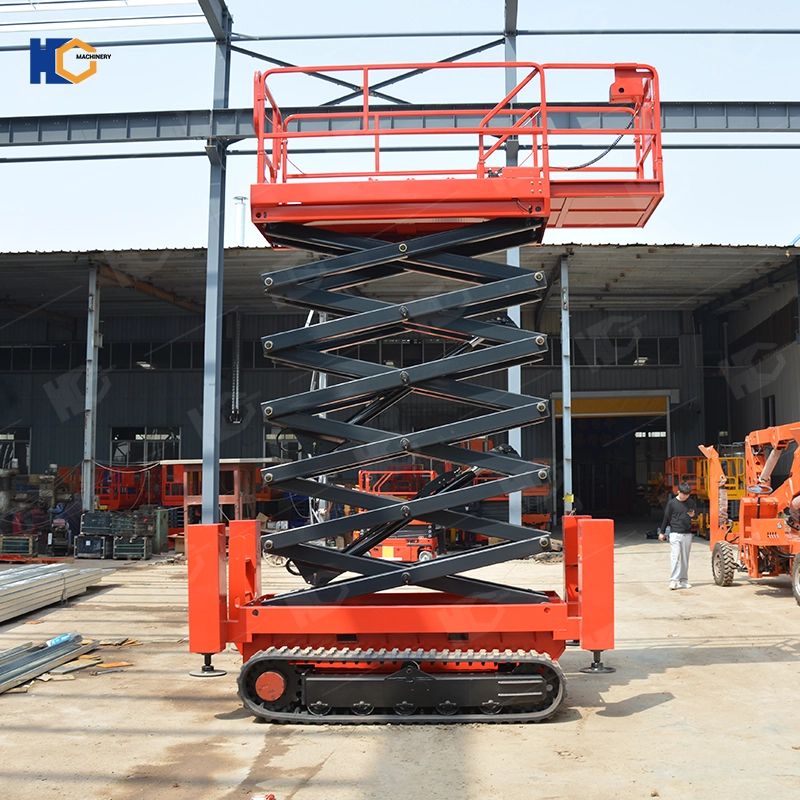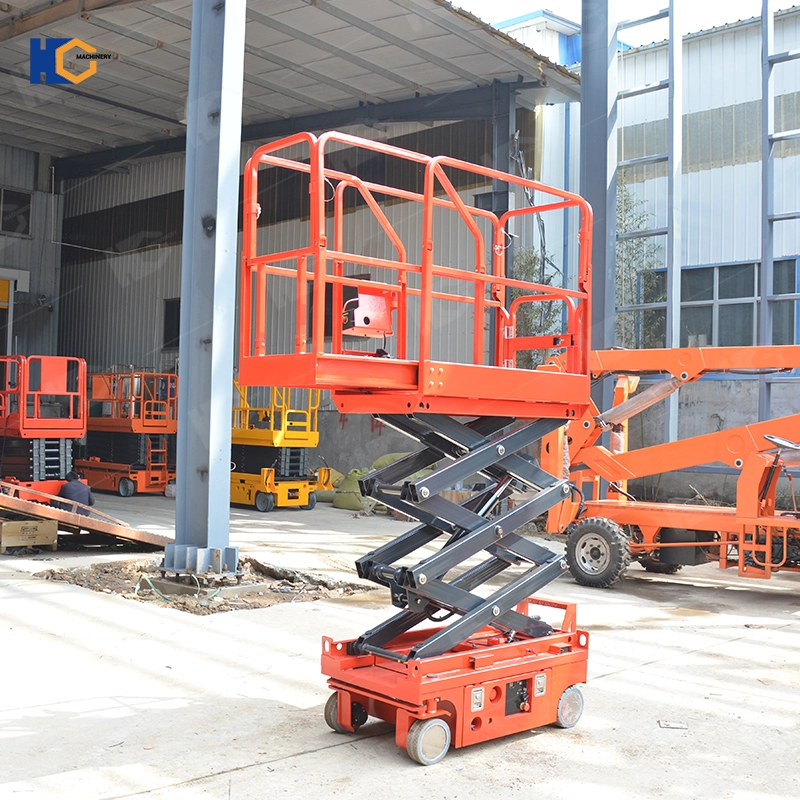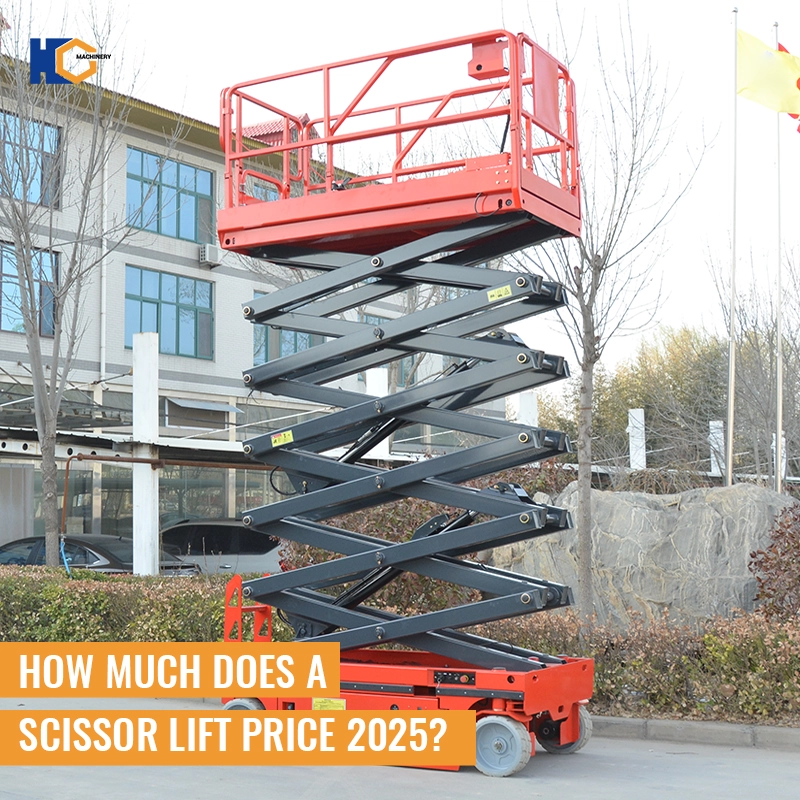China, the world's largest producer of scissor lifts, is expected to account for over 65% of global production in 2025, offering significant advantages in pricing competitiveness and product diversity.
Currently, scissor lifts are categorized into three main types: electric, diesel, and rough-terrain, with working heights ranging from 6 to 20 meters and load capacities typically between 200kg and 1,000kg. In 2025, technological advancements are driving trends toward electrification, intelligence, and lightweight design. The adoption of lithium battery technology has increased the market share of electric scissor lifts to 58%, while traditional lead-acid battery models have seen a 15% price drop.
 拷贝568737.webp)
Price Analysis of Scissor Lift Types in 2025
1. Electric Scissor Lifts
Electric scissor lifts dominate the market in 2025, holding a 60% share. Their price range depends on working height, load capacity, and battery type:
6-8m Standard Models:
Chinese brands: $8,500–$12,000 (lead-acid), $12,000–$16,000 (lithium)
International brands (e.g., JLG, Genie): $18,000–$25,000
10-12m Mid-Size Models:
Chinese brands: $15,000–$22,000
International brands: $28,000–$38,000
14-16m Large Models:
Chinese brands: $25,000–$35,000
International brands: $45,000–$60,000
Lithium battery models are 30–40% more expensive than lead-acid but last 2–3 times longer with 50% lower maintenance costs. For example, Zoomlion’s ZE1212E lithium model is priced at $18,800 in 2025, an 8% decrease from 2024.
2. Diesel Scissor Lifts
Diesel models remain indispensable for outdoor and harsh conditions. 2025 pricing:
8-10m Standard Models:
Chinese brands: $10,000–$14,000
International brands: $22,000–$30,000
12-14m Mid-Size Models:
Chinese brands: $18,000–$25,000
International brands: $35,000–$48,000
16-18m Large Models:
Chinese brands: $28,000–$40,000
International brands: $55,000–$75,000
Due to stricter emission regulations, Euro V/China IV compliant models cost 12–15% more. For example, Lingong’s L12DR diesel model is priced at $16,500, ideal for markets like the Middle East and Africa.
3. Rough-Terrain Scissor Lifts
Rough-terrain models command premium prices due to superior adaptability:
10-12m Basic Models:
Chinese brands: $25,000–$35,000
International brands: $50,000–$70,000
14-16m Enhanced Models:
Chinese brands: $40,000–$55,000
International brands: $80,000–$110,000
XCMG’s XH16XT rough-terrain model is priced at $48,800, featuring all-wheel drive and auto-leveling for exceptional value.

2025 Price Analysis of Leading International Brands
1. JLG
A global leader, JLG maintains premium pricing:
Electric: $20,000–$65,000
Diesel: $25,000–$80,000
Rough-terrain: $55,000–$120,000
The JLG 2630ES (10m electric) is priced at $28,500, 60% higher than Chinese equivalents but retains 45% residual value after 5 years.
2. Genie
Terex’s Genie offers flexible pricing:
GS-2630 (8m electric): $22,800
GS-3246 (10m diesel): $31,200
GS-5390 (18m rough-terrain): $92,000
A 10% discount is available for purchases bundled with a 5-year service plan.
3. Snorkel
Competitive in mid-to-high markets:
S3219E (6m electric): $16,500
S4732 (14m diesel): $42,800
S6380 (20m rough-terrain): $105,000
Trade-in programs offer up to 30% credit toward new equipment.
Competitive Pricing of Chinese Manufacturers
1. 2025 Price List of Major Chinese Brands
| Brand/Model | Type | Height | Price ($) | Key Features |
|---|---|---|---|---|
| Zoomlion ZE0808E | Electric | 8m | 10,800 | Lead-acid, domestic hydraulics |
| JNHC lift | Electric | 12m | 19,200 | Lithium, smart control system |
| Lingong L10DR | Diesel | 10m | 14,500 | China IV emission, dual-speed |
| XCMG XH12XT | Rough-terrain | 12m | 32,800 | 4WD, 1,000kg capacity |
| Sinoboom GTZZ15E | Electric | 15m | 28,600 | Lithium, maintenance-free design |
2. OEM/ODM Pricing from Chinese Factories
Major manufacturing hubs (Changsha, Xuzhou, Jinan) offer 2025 OEM pricing:
6-8m Electric (Basic): 6,800–6,800–8,500/unit (MOQ 50 units)
10-12m Electric (Standard): 11,000–11,000–14,000/unit
14-16m Diesel (Enhanced): 20,000–20,000–26,000/unit
Custom Rough-Terrain: +30–50% base price
Bulk purchases (100+ units) can reduce costs by 25–35% compared to retail.
3. Sources of China’s Cost Advantages
Localized Supply Chain: Over 90% of components (e.g., hydraulics, structural parts) are domestically sourced.
Economies of Scale: Top manufacturers produce 20,000+ units annually.
Innovation: Core technologies like lithium battery management are independently developed.
Policy Support: Tax incentives for high-tech enterprises.

2025 Rental Market Pricing
1. Daily/Weekly/Monthly Rates
| Equipment Type | Daily ($) | Weekly ($) | Monthly ($) | Annual ($/yr) |
|---|---|---|---|---|
| 8m Electric | 85–120 | 400–550 | 1,200–1,600 | 12,000–15,000 |
| 12m Diesel | 130–180 | 600–800 | 1,800–2,400 | 18,000–22,000 |
| 16m Rough-Terrain | 250–350 | 1,100–1,500 | 3,200–4,200 | 32,000–38,000 |
Prices include basic insurance but exclude transport/operator fees.
2. Purchase vs. Rental Cost Comparison
Example: 12m electric scissor lift over 5 years
| Item | Purchase (Total Cost for 5 Years) | Rental (Total Cost for 5 Years) |
|---|---|---|
| Equipment Cost | $19,200 | - |
| Maintenance Cost | $3,800 | - |
| Residual Value | -$8,600 | - |
| Total Cost | $14,400 | $75,000 |
| Applicable Scenarios | Usage duration is more than 800 hours per year | Project-based needs |
3. Global Rental Company Pricing
United Rentals: Premium service, 12m electric at $1,800/month
Sunbelt Rentals: Promotions, same model at $1,650/month
China Hongxiang Equipment: Local advantage, $1,200/month
Key Factors Influencing 2025 Prices
Raw Material Costs: Steel (¥4,200–4,800/ton) accounts for 35–40% of production costs.
Technology: Smart anti-collision systems add 10–15% to prices but reduce accidents by 30%.
Logistics/Tariffs: China–U.S. shipping costs ($3,800–4,500/40HQ container); 6–12% tariffs for exports.
Energy Transition: Lithium battery costs dropped 40% since 2022, lowering electric model prices.
Certifications: CE/ANSI compliance adds 2–3% to prices but is essential for premium markets.
Top 10 Professional Tips for B2B Buyers
Match Needs Precisely: Select based on height (+2m buffer), load capacity (+20% buffer), and work environment.
Calculate Total Cost of Ownership (TCO): Include energy, maintenance, and residual value over 5 years.
Bulk Purchase Strategy: Orders of 20+ units secure 12–18% discounts; phased deliveries ease cash flow.
Optimize Financing: Leasing options require 20% down payment with 4.5–6.5% annual interest.
Evaluate Chinese Factories:
Check >85% welding automation rates.
Verify critical components (motors, controllers).
Request 3+ customer references for similar models.
Contract Essentials:
2-year/2,000-hour warranty minimum.
48-hour onsite service response.
≥95% spare parts availability.
Future-Proofing: Choose modular designs for easy smart system upgrades.
Compliance: Ensure certifications (ANSI/CE for U.S./EU, GCC for Middle East).
Supply Chain Resilience: Prioritize suppliers with 6-month inventories of critical parts (e.g., chips).
Resale Value: Popular brands/models retain 20%+ higher residual value after 5 years.

Best Times to Purchase in 2025
Q1 (March): Post-Chinese New Year production ramp-up; high price flexibility.
Q3 (July–August): Mid-year sales targets drive dealer discounts.
Avoid:
Pre-Lunar New Year (January): Production bottlenecks.
Year-End: Limited inventory and exhausted budgets.
After-Sales Cost Considerations
Service costs account for 15–25% of TCO. Prioritize:
Brands with service centers within 200km.
Maintenance packages .
Free operator training programs.
2025–2028 Price Forecast
Electric Standard Models: 3–5% annual price drop.
Diesel Models: Stable (±2%).
Smart Premium Models: 4–6% annual increase.
Rental Rates: ±8% fluctuations tied to interest rates.
Conclusion
In 2025, scissor lift pricing will diversify further, with Chinese products 30–50% cheaper than international brands but rapidly closing the technology gap. B2B buyers should adopt a Total Cost of Ownership (TCO) approach, aligning purchases with business growth strategies.
Recommended Strategies:
Large Enterprises: 70% Chinese brands + 30% international premium models.
Mid-Sized Firms: Prioritize leasing for flexibility.
Rental Companies: Focus on versatility and ease of maintenance.
By making data-driven procurement decisions, scissor lifts can become a powerful tool for enhancing aerial work efficiency and safety.

833.webp)
824.webp)
322.webp)